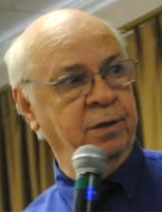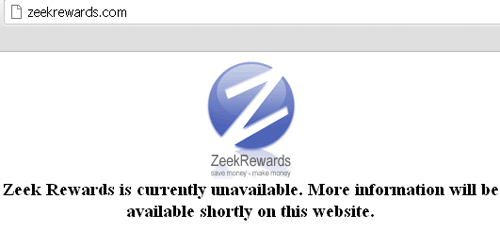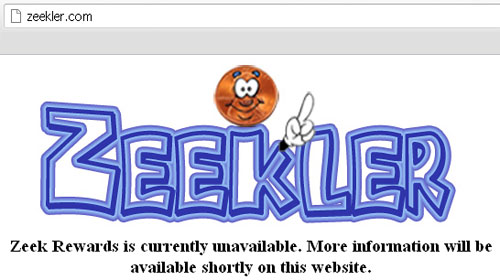Did Zeek Rewards management know about the SEC?
All our critics (are) self-appointed with no standing in the professional community (and are) behaving unprofessionally by acting on false information.
-Gregory Caldwell, “Acting” COO of Zeek Rewards on August 4th, 2012

Whilst much is still currently unclear regarding the specifics of Zeek Rewards CEO Paul Burks’ dealings with the SEC in the lead up to Zeek being shut down, bits and pieces are finally (albeit slowly) starting to trickle out into the public sphere.
With many of Zeek Reward’s executive management holding affiliate accounts to participate in the company’s Ponzi scheme, one of the most pressing queries has been the question of how aware of the SEC investigation were Zeek Rewards corporate executives, if at all.
Knowing full-well that Zeek Rewards was a Ponzi scheme and being aware of the SEC investigation and a resulting shutdown is vastly important, as such knowledge (and the suppression of it) put Zeek’s management in a conflictingly advantageous position as investors.
Whilst regular affiliates continued to re-invest the bulk of their daily ROIs and encourage new investors to come on board, continuing on unawares right until the precise moment Zeek Rewards was shut down, Zeek’s executive management, aware of the SEC situation and what was occurring, could have easily been quietly cashing out as much as possible from their personal affiliate accounts.
Indeed, if you look at the actions of some of Zeek Rewards’ more prominent executive management in the last few months of Zeek Rewards, a distinct pattern emerges.
Former COO Dawn Wright-Olivares all but vanished from the public eye after informing affiliates Zeek Rewards would not be able to pay them unless they “deposited more money” into Zeek’s e-wallet accounts (June 26th).
A week later Zeek Rewards Sales Director Darryle Douglas disappeared off the face of the planet for “personal matters” on July 30th. Such “personal matters” were never elaborated on by the company and following the official announcement, Douglas was never publicly heard from again.
Although not Zeek Rewards corporate, it’s worth noting that around the same time as Wright-Olivares’ and Douglas’ departures into obscurity, Keith Laggos, a paid consultant of Zeek Rewards, claimed that the FTC were going to shut down Zeek Rewards. He also began to promote Lyoness to his Zeek Rewards affiliate downline as a ‘Plan B’.
For his efforts, Laggos was terminated as a paid Zeek Rewards consultant on or around July 24th. To date it remains unclear whether or not Laggos also lost his “$40,000 a month” Zeek Rewards affiliate account.
Three of Zeek Rewards’ previously prominent top public figures went underground within the space of a month. And just under three weeks later, the SEC shut the company down for being a Ponzi scheme.
Hindsight analysis would indicate the witnessing of a typical Ponzi scheme pre-planned exit strategy. With everyone involved appearing to have lawyered up and refuse to make any public statements though, it appears we’re going to have to wait to get any further clarification on the matter.
In the meantime, a recently leaked email from Greg Caldwell certainly suggests that Zeek’s executive management had at least some idea of what was happening. [Continue reading…]
Bidify launch second compensation plan in a week

In the wake of the Zeek Rewards Ponzi scheme being shut down by the SEC, rival penny auction Bidify almost immediately shut down their own similar Ponzi points compensation plan announcing that they’d be bringing out a more “traditional” MLM focused plan shortly.
A few days later Bidify relaunched with what I’m calling v2.0 of their compensation plan. In a nutshell, the Ponzi points were gone and in its place a stock standard unilevel commissions structure which paid out residual commissions on the sale of bids.
Other than some cruises, there was little else to it. With the SEC having shed light on suspicions that the former largest MLM penny auction in the world was unable to attract significant retail customers, Bidify was probably not going to fare too well down the track.
Indeed, just a few days ago I wrote:
I’d strongly suggest any change in Bidify’s compensation over the next few weeks would be an indication that a MLM penny auction relying on the sale of bids to customers isn’t really viable.
Three days later and here we are with the Bidify compensation plan v3.0.
So what’s changed? [Continue reading…]
Bidify relaunch with “traditional” MLM comp plan
Foreword: On the 28th of August Bidify made some additional changes to their compensation plan. In order to catalogue the changes, the original Bidify compensation plan shall be referred to as v1.0, the changes in this article reflect v2.0 and the new changes v3.0.

Following the SEC take down of Zeek Rewards for running a $600 million Ponzi scheme, Bidify immediately announced they were reducing the initial investment amount US-based members could make, from 25,000 Euros down to 5,000.
Largely seen as an irrelevant cosmetic change, which appears to be somewhat of a recurring theme over at Bidify, less than 24 hours later after this announcement the company announced they were shutting down Bidify altogether to remodel their compensation plan.
With Bidify being Zeek Rewards’ biggest competitor and roughly half way into their penny auction points 120 day run (after which a true test of their viability would have taken place), this was largely seen as confirmation that, as many suspected, a MLM penny auction pegged to a points based compensation plan was not sustainable without mostly paying newly invested affiliate money.
Zeek Rewards had been doing exactly this for nearly two years to the tune of 98% of the daily ROI paid out consisting of newly invested affiliate money.
In any case, shortly after taking Bidify offline to work on a new “more traditional” compensation plan for their affiliates, Bidify popped back online yesterday.
Read on for a review of the new Bidify compensation plan. [Continue reading…]
CEO Paul Burks admits Zeek Rewards a Ponzi scheme
If I were to disappear today, it’d probably be a long time before any of you even knew it.
-Paul Burks, CEO of Zeek Rewards

Following the collapse of the Zeek Rewards Ponzi scheme, much speculation has focused on the extent of the involvement of Zeek’s executive management.
The SEC in their complaint claimed that Paul Burks single-handedly was responsible for manually adjusting the daily percentage ROI paid out to affiliates, but beyond that exactly who was responsible for what is unclear.
For the most part, Zeek Rewards executive management have gone into hiding and their whereabouts is currently unknown. Sales Director Darryle Douglas disappeared a few week ago due to “health reasons” and Chief Marketing Officer Dawn Wright-Olivares is yet to make a public appearance following the Ponzi collapse.
Recently appointed Chief Operating Officer Greg Caldwell has been largely silent but is believed to be helping investigators with their enquiries at a corporate level. Whether Caldwell still believes in the company or is merely performing contractual and/or legal obligations with Zeek Rewards however is unclear.
With no criminal charges having been filed, again speculation has been rife over whether or not there will be any future charges laid out. Primarily the focus in on Paul Burks who, other than paying a $4 million fine to the SEC, appears to have (for now) gotten off scott-free.
Claims as to why criminal charges haven’t been filed against Paul Burks and other members of Zeek Rewards executive management largely focus around the length of time investigations take place.
Currently the US Secret Service and North Carolina Attorney General’s Office are known to have investigations open on Zeek Rewards, but the status of each investigation is unclear.
A third agency was claimed to also have an investigation open into Zeek Rewards by the media but as of yet no further details have been made public.
Meanwhile those, perhaps still in denial about whether Zeek Rewards was indeed a Ponzi scheme, proclaim the innocence of Paul Burks and his team.
Troy Dooly of MLM Helpdesk in particular has recently started pushing the idea that Zeek Rewards might have been infiltrated by some sort of murky international Ponzi scheme ring.
But what if Burks knew all along what he was doing was a Ponzi scheme? What if not only he knew but did nothing to stop it?
Today we explore those very questions. [Continue reading…]
Visalus Review: Weightloss via monthly shake kits

Visalus launched way back in March 2005 and operate out of California in the US.
The company markets weight-loss products and was co-founded by Blake Mallen and Nick Sarnicola. Visalus also list Ryan Blair as a co-founder, but from what I can tell he joined the company post-launch. Blair currently serves as Visalus’ CEO.

Normally I have to do my own research into a company but with Visalus being as old and established as it is, the Visalus Wikipedia entry (with cited references) provides a detailed synopsis of the company’s history:
ViSalus Sciences was incorporated as a Troy, Michigan-based limited liability corporation in March 1997.
The company was founded by Nick Sarnicola and Blake Mallen, who were, at the time, distributors for another multi-level marketing company called The Free Network—a firm that went under because it provided obsolete services in long distance calling, dial-up Internet access, and paging.
After The Free Network folded, Mallen and Sarnicola devoted their time to promoting ViSalus in Northern California.
In October 2008, Blyth, Inc. announced that it was acquiring ViSalus in a takeover, initially purchasing a 43.6% equity interest for $14.0 million.
Blyth completed the second phase of the takeover in April 2011, investing an additional $2.5 million and increasing their ownership share to 57.5%.
After the company was purchased by Blyth in 2008, it almost went bankrupt. Ryan Blair, a former gang member and the current CEO of Visalus, invested $1 million in the company and eventually led its turnaround to $34 million income in 2010.
In September 2011, ViSalus opened up their business to Canadian residents.
As for Blyth Inc.,
Blyth, Inc. is a Greenwich, Connecticut based marketing and manufacturing company that sells personal and decorative products.
The company reported having 4,000 employees as of January 2007 and is incorporated in Delaware. In 2001, it was the largest candlemaker in the United States.
If you’re curious about Ryan Blair’s gang-related history (as I was), you can read more about it in Krikus Reviews’ review of Blair’s 2011 book, “Nothing to Lose, Everything to Gain”:
millionaire entrepreneur Blair tells his compelling story: a troubled street kid overcomes a broken home and a drug-addled father to amass a vast fortune before the age of 30.
As tantalizing as that history is, however, the author never really digs into it here beyond referencing his time as a somewhat incongruous Southern California gang-banger.
Readers hoping to learn exactly how a scrawny white kid from a formerly stable middle-class life transformed himself into a hard-edged hoodlum—only to renounce it all—will be somewhat disappointed.
Rather, Blair provides a course in Entrepreneurism 101 with a rather vague and ill-defined human-interest back story for inspiration.
As Krikus note, it’s definitely an interesting backstory, but unfortunately most of the specifics remain unclear. Having been around the MLM publicity block a few times the cynic in me can’t entirely brush it off as a somewhat embellished marketing hook.
That said, apart from sheer curiosity Blair’s past won’t be a focal point in this review and I don’t consider it significant to the business operations of Visalus.
Read on for a full review of the Visalus MLM business opportunity. [Continue reading…]
Bidify scrap Ponzi points compensation plan

Following the aftermath of the collapse of Zeek Rewards, much attention has now been focused on the MLM penny auctions still standing.
With the money rolling into Zeek it didn’t take long for a slew of copy-cat competitors to spring up. Grab a penny auction script, engage some drop-ship suppliers (or just use Amazon) and off you went.
The MLM penny auctions in the article above are all currently in pre-launch and following recently development, it remains to see whether they will indeed proceed to launch. I have read a statement from Global One for example reassuring their members that they are going ahead with their point based compensation plan, regardless of what happened to Zeek.
Looking at the penny auction MLMs that have already launched, Bidify has undoubtedly received the most attention. I myself continue to receive email requests daily asking for a review on Bidify, despite the fact I already published one back in late July.
As a points based MLM penny auction that fundamentally works in the same manner as Zeek Rewards, I have no doubt that the same Ponzi scheme mechanics exist within Bidify.
Having kept track of the daily ROI the company was paying, I’d observed that after kicking off with an initial 5+% ROI pay out, this steadily decreased to regular payouts in the low 1%s, with the daily percentage rate even dropping to as low as 0.8% over the last few weeks.
Naturally the first few days of Bidify members investing in new bids shortly after launch skewered the daily ROI rate average but by all indications, even with 120 days to recover their bid purchase investment, the continuously dropping daily ROI rate wasn’t painting a pretty picture.
In any case, any planned analysis of the ROI Bidify was paying out are now dashed with the company informing members that they have scrapped the points compensation plan they were using. [Continue reading…]
THE FACTS: Dissecting the Zeek Ponzi apocalypse

Zeek Rewards was first reviewed here on BehindMLM way back in September 2011 and just two days after my initial review (in which I struggled to see the attraction of retail customers to the business), I wrote a followup exploring the passive investment nature of Zeek.
What has followed over the past eleven months can only be described as a communal firestorm of critical analysis and exploration of Zeek Rewards, its business model, money trail, compensation plan and commissions structure from every angle imaginable.
20 something articles later and thousands of comments exchanged between fellow analysers, blind cheerleaders, cautious profit seekers, harsh critics and a host of characters, today saw the conclusion of that analysis finally put to the test.
Often dismissed for “not having the facts”, today we look at just how accurate the discussion and analysis here at BehindMLM was in deconstructing and analysing the $600 million dollar Zeek Rewards Ponzi scheme.
Filed as a complaint in a North Carolina District Court, the following facts and figures are taken directly from an undercover SEC investigation into Zeek Rewards, Zeekler, Rex Venture Group (the parent company) and Paul Burks (CEO and owner of all three).
An investigation which yesterday, culminated in the shutting down of Rex Venture Group’s entire operations. [Continue reading…]
SEC file charges against $600M Zeek Rewards Ponzi

Speculation has run rife over the past 24 hours following the surprise closure of Zeek Rewards home office in Lexington, North Carolina.
It was originally believed that the North Carolina Attorney General might have ordered the closure but this was later denied by the NC AG’s office.
Following this announcement, it was then reported by North Carolina’s “The Dispatch” that Secret Service agents had rocked up to Zeek’s offices to take statements from affiliates.
When approached by the Dispatch, Special Agent Glen Kessler informed them that the Secret Service were working with the SEC on an investigation into Zeek Rewards, but that ‘the Secret Service does not comment on ongoing investigations’.

Just hours later, it was then announced the SEC had filed fraud charges in Charlotte, North Carolina and an emergency asset freeze against Zeek Rewards, Zeekler, Rex Venture Group and CEO Paul Burks (photo right).
The SEC claim Zeek Rewards was a $600 million Ponzi scheme on the verge of collapse and that their emergency action to freeze company assets will ensure that ‘victims can recoup more of their money and potentially avoid devastating losses‘.
According to the SEC’s complaint, ZeekRewards has paid out nearly $375 million to investors to date and holds approximately $225 million in investor funds in 15 foreign and domestic financial institutions. Those funds will be frozen under the emergency asset freeze granted by the court at the SEC’s request.
BREAKING: Zeek Rewards pull plug on Ponzi scheme

Just over a week after the North Carolina Attorney General’s Office confirmed they’d demanded information from Zeek Rewards and had concerns about their business model, Zeek Rewards has pulled the plug on both Zeek Rewards,

and Rex Venture’s Zeekler penny auctions:

At the time of publication, Rex Ventures’ news blog ‘Zeek Rewards News’ and ‘Shopping Daisy were the only two company properties that remained online.
The Zeek Rewards Facebook page also remains online, however the company has stepped up its efforts to prohibit complaints being published to the site.
Zeek Rewards affiliates have reported that in addition to having their comments deleted by the group’s admin that their Facebook accounts had also been banned from participating. [Continue reading…]
AiYellow Review: No retail and a useless directory

On the AiYellow website, the company details a history spanning back to 2005, which appears to be when a management board got together and decided to go ahead with the company.
No idea what happened over the next three years but in 2008 the company claims it was incorporated in the US. Another three years of marketing to third-world countries and AiYellow finally announced a global launch to take place in June, 2012.
I’m not exactly sure why they had to announce a global launch, given the company was already claiming it’s affiliates had already generated $50 million in cumilatative revenue globally as of June 2012.
AmarillasInternet and AiYellow were co-founded by President Martin Naka and Vice-President Rick Cabo. I had a look for any signs of a history in MLM but was unable to find one for both men.
Trying to establish where AiYellow (and parent company ‘Amarillas Internet’) are operating out of is anything but a straightforward task. The company has two primary domains, ‘aiyellow.com’ and ‘amarillasinternet.com’, with both listing different registrant addresses for ‘AmarillasInternet Corp.’
aiyellow.com (registered on the 9th December, 2010) lists
5545 Whitsett Ave #1
Valley Village, California 91607
United States
whilst amarillasinternet.com (registered on the 12th January, 2007) lists
25 SE 2nd Ave. Suite 410
Ingraham Building
Miami, Florida 33131
United States
Meanwhile the AiYellow ‘Terms and Conditions’ state that
AmarillasInternet Corporation (has) its principal headquarter office located at: 990 Biscayne Blvd., Suite 503, Miami Florida 33132
but at the same time also mentions that AmarillasInternet is ‘an American privately held corporation organized and existing under the laws of the State of Delaware‘.
No address in Delaware however is provided by the company, with the Delaware business registration (file number: 4625981) only providing an agent address for ‘Delaware Intercorp’ in Newark.
One would think addresses in two US states was enough, but AmarillasInternet is also registered in Florida as a ‘Foreign Profit Corporation’ (EIN: 263779909), giving an entirely different address again, this time in Argentina:
NAKA, MARTIN S
JULIO A. ROCA 95, VILLA GRAL BELGRANO
CORDOBA, ARGENTINA AR 5194

Muddying things up even more is the fact that AiYellow co-founder and President Martin Naka (photo right) also appears to have a presence in Montevideo, Uruguay:
Domain Name: CAMARAMERCOSUR.ORG
Registrant Name: Martin Naka
Registrant City: Montevideo
Registrant Postal Code: 1374
Registrant Country: UY
Spanish is the official language of Uruguay and this also explains AmarillasInternet and AiYellow’s heavy South American presence, and the fact that most of the information online regarding the two companies is in Spanish.
What on Earth is going on with AmarillasInternet and AiYellow in the US I have no idea but Uruguay and Argentina at least kind of make sense, given that both country’s official language is Spanish, which is the language most of the information about AiYellow and AmarillasInternet online is in (not to mention the company’s strong presence in South America).
Read on for a full review of the AiYellow MLM business opportunity. [Continue reading…]

